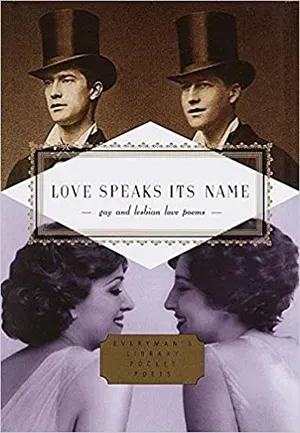LOVE SPEAKS ITS NAME: GAY AND LESBIAN LOVE POEMS
J.D. MCCLATCHY, ed.
Everyman's Library Pocket Poets, 2001
What did people do, in the distant or not-so-distant past, in cultures where homosexuality was outlawed? How did lovers find each other? How did they express their feelings, flirt, court, end up together? What did togetherness mean in places and times where their kind of love was against the law?
Poetry, for centuries, has been an essential tool for expressing both love and desire, especially for "the love that dared not speak its name." In the anthology Love Speaks Its Name, J.D. McClatchy has assembled a collection of poems "written by men and women whose desires for love, over the centuries, have been condemned and persecuted." Poetry, he says, is the perfect tool to disguise love that reveals itself only to those who know "how and where to look."
The art of metaphor conceals and reveals at the same time, saying what is by describing what is not. Richard Barnfield (1774–1627), in his sonnet "Here, Hold This Glove," expresses his longing by asking the "sweet boy" he desires to hold his glove, because "If thou from glove do'est take away the g, / then glove is love, and so I send it thee." An ordinary glove becomes the secret messenger of desire.
Likewise Amy Levy (1861–1889), an early feminist who asserted her rights in poetry as well as protest, uses simple rhyming quatrains to evoke a hidden love expressed by glances across the table at a dinner party. Since "All the world is blind," the lovers can look at each other openly, enjoying their love as well as the pleasure of bamboozling the unsuspecting guests.
Muriel Rukeyser (1913–1980) in "Looking at Each Other" develops this ides of the glance – the look of love – in a poem that probes the many dimensions of a gaze that expresses the entire act that, to borrow Walt Whitman's expression, "contains multitudes."
Love Speaks Its Name is an anthology that contains multitudes – a great place to start if you're looking for love poems from the distant and recent past that resonate with the ambiguities of today's barriers and freedoms to love.
"Sonnet" by Richard Barnfield
Here, hold this glove (this milk-white cheveril glove)
Not quaintly over-wrought with curious knots,
Not deckt with golden spangs, nor silver spots,
Yet wholesome for thy hand as thou shalt prove.
Ah no; (sweet boy) place this glove neer thy heart,
Weare it, and lodge it still within thy brest,
So shalt thou make me (most unhappy), blest.
So shalt thou rid my paine, and ease my smart:
How can that be (perhaps) thou wilt reply.
A glove is for the hand not for the heart,
Nor can it well be prov'd by common art,
Nor reasons rule. To this, thus answers I:
If thou from glove do'st take away the g,
Then glove is love: and so I send it thee.
"At a Dinner Party" by Amy Levy
With fruit and flowers the board is decked,
The wine and laughter flow;
I'll not complain–could one expect
So dull a world to know?
You look across the fruit and flowers,
My glance your glances find.–
It is our secret, only ours,
Since all the world is blind.
"Looking at Each Other" by Muriel Rukeyser
Yes, we were looking at each other
Yes, we knew each other very well
Yes, we had made love with each other many times
Yes, we had heard music together
Yes, we had gone to the sea together
Yes, we had cooked and eaten together
Yes, we had laughed often day and night
Yes, we fought violence and knew violence
Yes, we hated the inner and outer oppression
Yes, that day we were looking at each other
Yes, we saw the sunlight pouring down
Yes, the corner of the table was between us
Yes, our eyes saw each other's eyes
Yes, our mouths saw each other's mouths
Yes, our breasts saw each other's breasts
Yes, our bodies entire saw each other
Yes, it was a new beginning in each
Yes, it threw waves across our lives
Yes, the pulses were becoming very strong
Yes, the beating became very delicate
Yes, the calling the arousal
Yes, the arriving the coming
Yes, there it was for both entire
Yes, we were looking at each other
Sharon Cumberland is professor emerita of English and creative writing at Seattle University.


